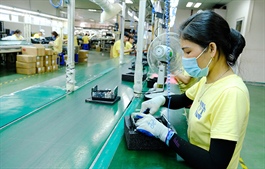Central Highlands help farmers gain OCOP certificates
Central Highlands help farmers gain OCOP certificates
Central Highlands authorities are seeking to boost the quality of the region's products to meet OCOP standards.

One Commune One Product (OCOP) is a national certificate programme that seeks to facilitate the development of regional agricultural specialties and rural tourism. The Central Highlands region is trying to develop hundreds of products that have OCOP-certified products to elevate value and help farmers escape poverty.
In 2018, Nguyen Van Hai, a farmer in Buon Don District, Dak Lak Province, started to invest in goat milk production and processing dairy products in order to receive OCOP stars.
After a few years of constantly producing products with food safety requirements and other standards, his farm products now have all received three-star OCOP certificates.
These products have been distributed nationwide and brought back significant economic benefits, helping many locals escape poverty.
Duong Tin Duc, deputy chief of Dak Lak Province Coordination Office for New Rural Construction, said that as of right now, the provincial People’s Committee has recognised 72 products with three or four-star OCOP certificates.
The four-star products, including coffee, cacao beans and macadamia nuts, have the potential to receive the five-star certificate and can be exported worldwide.
In Tu Mo Rong District, Kon Tum Province, 19 products have been given three and four-star OCOP certificates, such as panax ginseng, coffee and mushrooms.
Gia Lai Province has 214 three and four-star OCOP products while Lam Dong Province has 155 five-star products related to herbs, foods and drinks, which include nine five-star products and 79 four-star products.
However, some obstacles exist in the process of developing OCOP certificates in the Central Highlands.
For example, Lam Dong Province Rural Development Sub-Department said that some farmers did not understand the benefits in changing their production and marketing process to meet with the OCOP standards, or were unfamiliar with OCOP licensing procedures.
Dak Lak Province Coordinating Office for New Rural Construction said that the programme faces some challenges due to local farmers’ lack of finance and skill to satisfy OCOP requirements.
Other limitations include poor trade facilitation, false advertising and few large-scale farms.
Dak Lak Province's target in 2025 is to have around 250 OCOP three-star products, and at least three five-star ones.
Duong also said that the province will integrate the OCOP programme into new-style rural areas development and sustainable poverty reduction programmes to help raise local incomes.
Tran Van Hiep, chairman of Lam Dong Provincial People's Committee, said that the province will work on opening large-scale production facilities that meet OCOP standards, build pre-processing and processing plants, and focus on building agricultural brands.
Both provinces are also trying to push trade facilitation, expand markets and raise demand for OCOP products.


























